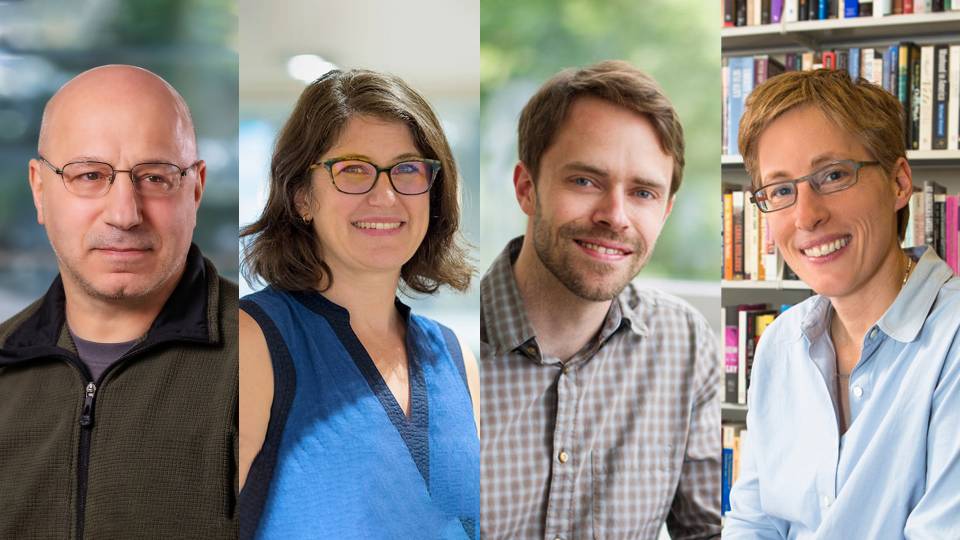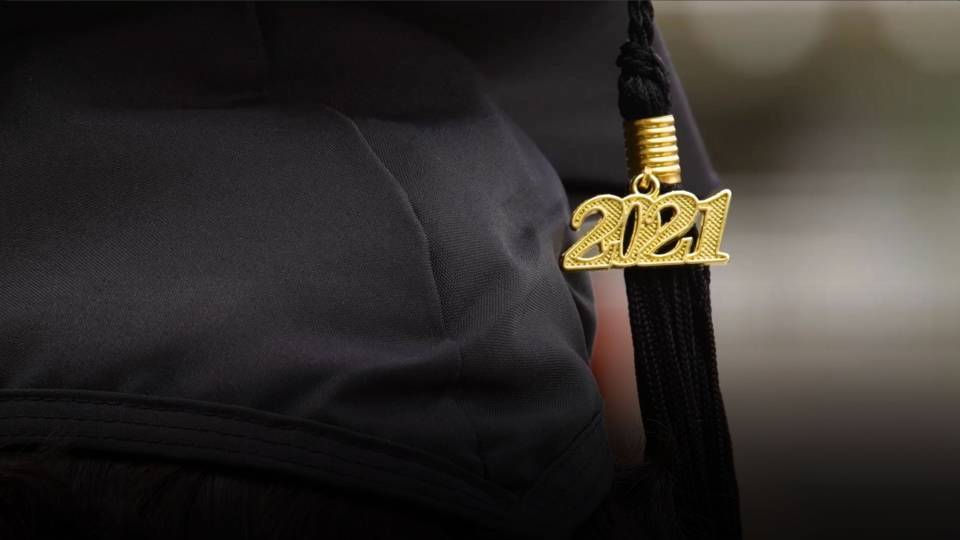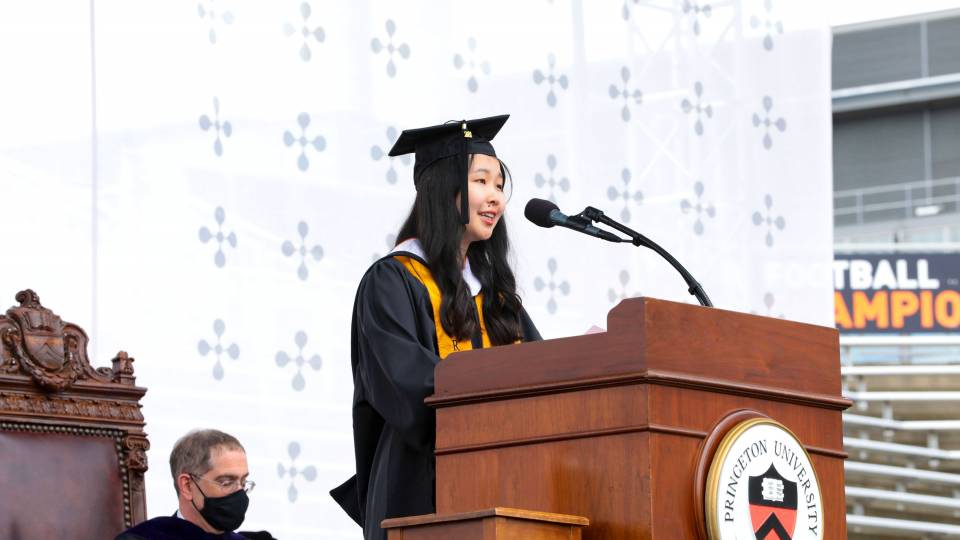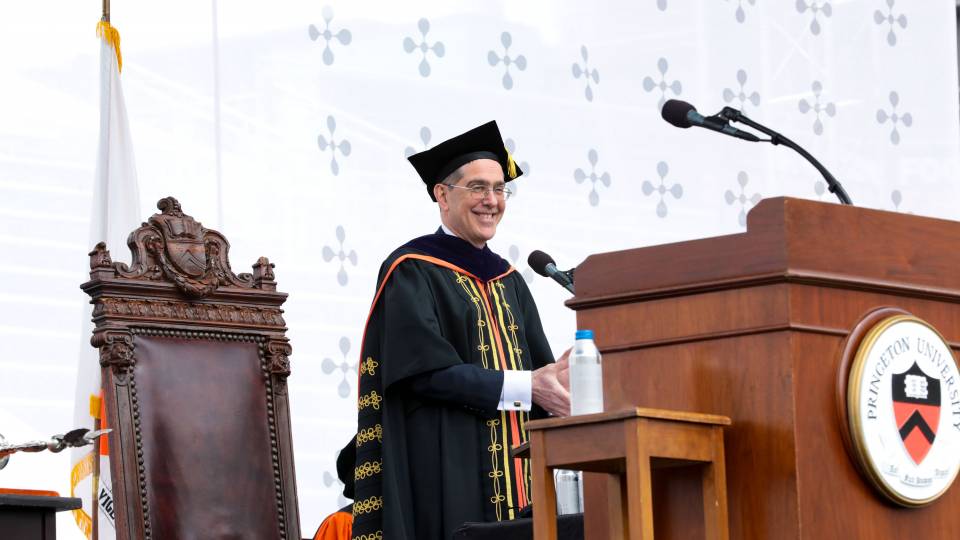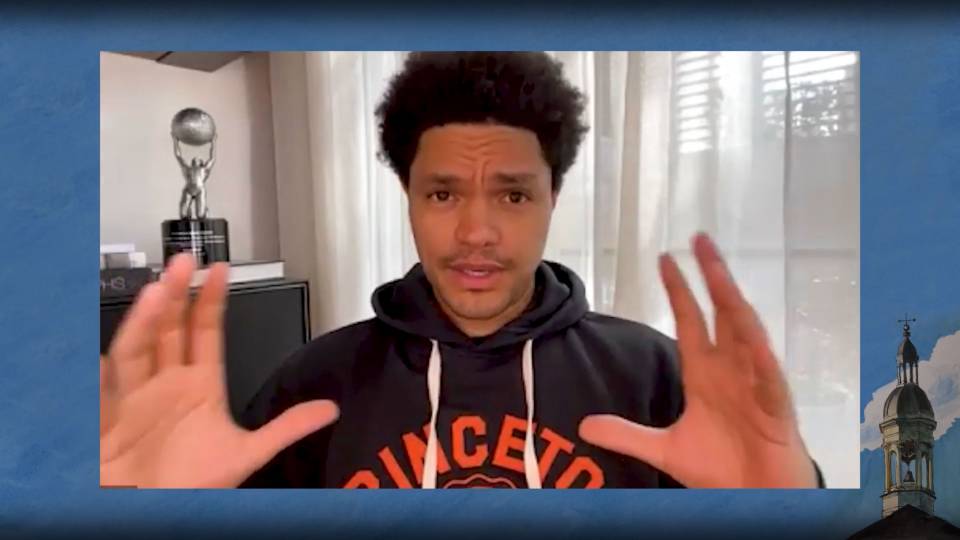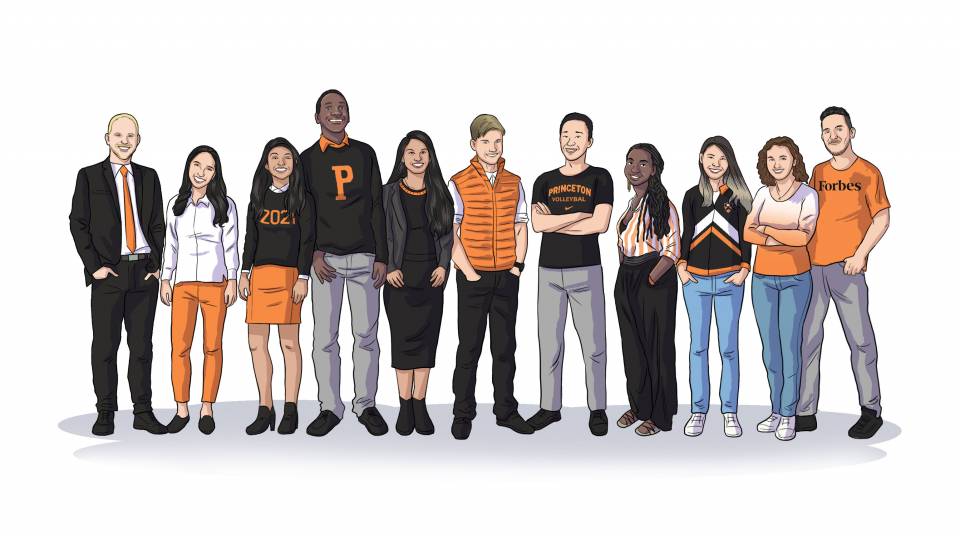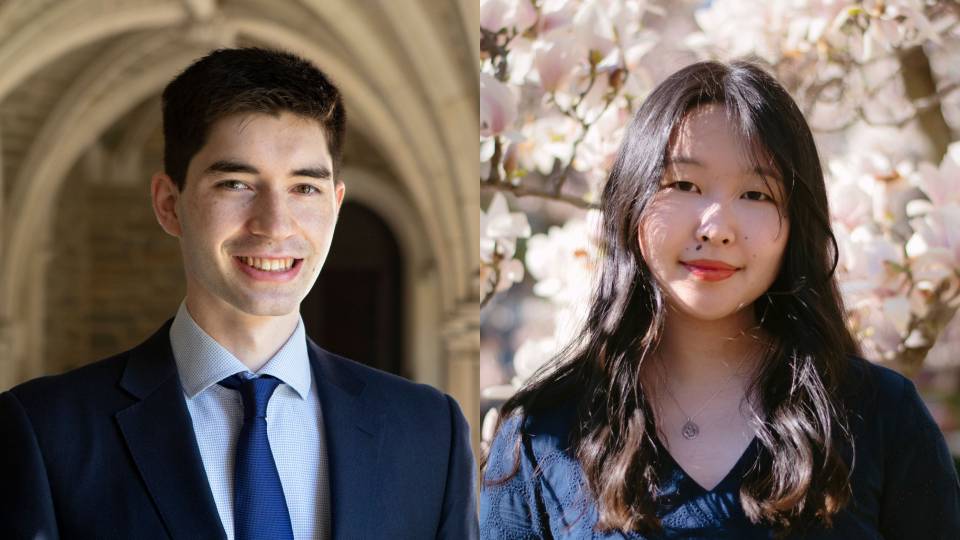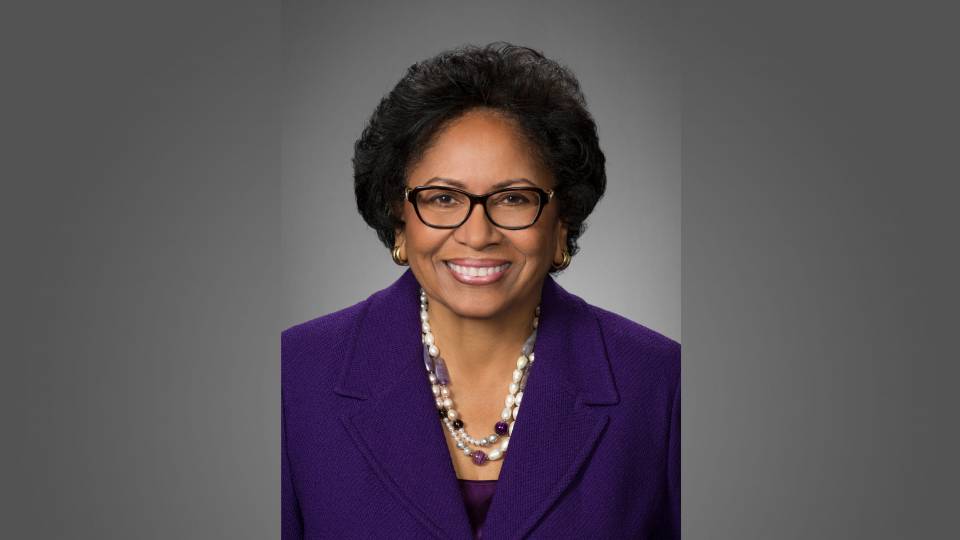Graduation events for Princeton’s Class of 2021 began on Saturday, May 15, with the 274th Baccalaureate, an interfaith service that is one of the University’s oldest traditions.
The event included remarks by University President Christopher L. Eisgruber and Dean of Religious Life Alison Boden, as well as blessings from three seniors: a Buddhist blessing from Shanaz Deen, a secular humanist blessing from Tilmann Herchenroder, and a blessing from the Church of Jesus Christ of Latter-day Saints from Natashia Neckles.
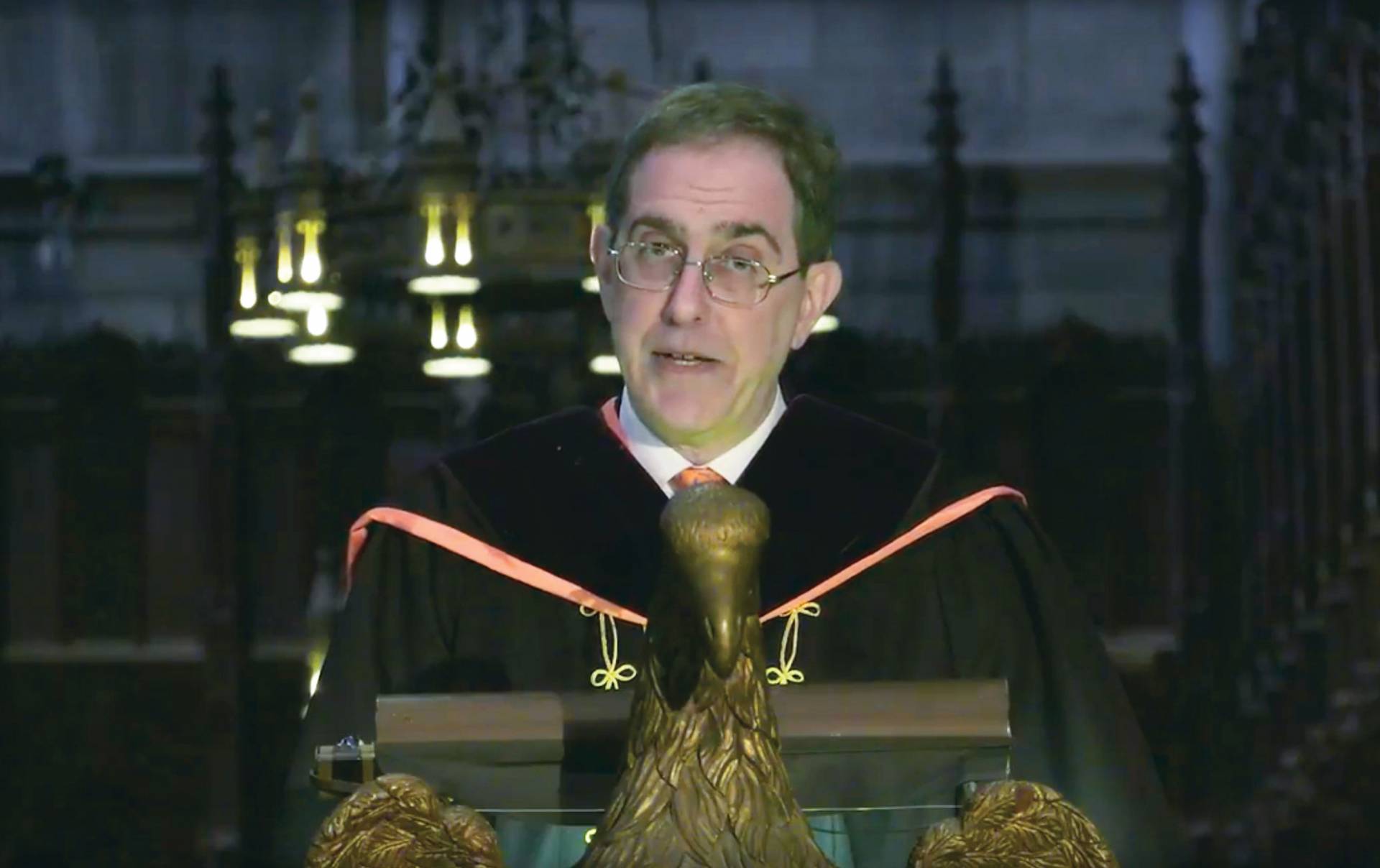
President Eisgruber introduced Baccalaureate speaker Ruth J. Simmons, saying in part:
“Ruth is among the greatest leaders in higher education, with an extraordinary ability to encourage and inspire people and institutions to become the best possible versions of themselves. Over the course of her unparalleled career, Ruth has served as a transformative president for Smith College; for Brown University, where she became the first female president at Brown and the first Black leader of an Ivy League University; and now, for Prairie View A&M University. At these institutions and beyond, she has driven progress to expand college access and opportunity, to strengthen and promote academic excellence, and to enhance diversity, equity, and inclusion. She is passionate, she is dedicated, and she is tireless.
Remarks by Ruth Simmons for Princeton’s 2021 Baccalaureate ceremony, as prepared:
Good day and congratulations, Class of 2021!
It was with great pleasure and humility that I accepted the invitation to address you. It was with pleasure because of my high regard and gratitude for what Princeton has meant in my life. It was with admiration for the many ways the University has evolved during my lifetime, expanding greatly on its commitment to ideals of high purpose and service. While I’m not able to stand at the ceremonial oaken lectern in Princeton’s magnificent Collegiate Gothic chapel to deliver this address, I can assure you that I am there in spirit as I visualize all of you celebrating the end of your time at Princeton and the beginning of important life journeys.
Were I in the Chapel today instead of standing on my own campus at Prairie View A&M University, I would once again marvel at such a creation inspired by iconographic stonework and carvings from the Middle Ages on the one hand and post-revolutionary France on the other. The architects’ homage to Princeton’s motto reflects well the way in which the University and society as a whole evolves, taking from different traditions and periods a means to understanding better our own times. I am excited to imagine the many ways that you will carry on this tradition, bravely serving a world in urgent need of change, insight and comfort.

I first arrived at Princeton a refugee from Los Angeles where I had been Associate Dean of the Graduate School at the University of Southern California. The implementation of the College system at Princeton had piqued my interest; “What must it be like,” I thought at the time, “to emphasize to such an extent the importance and artful design of the undergraduate community of learning?” I knew in an instant that I wanted to be a part of such an experiment, for I had long understood how powerfully important these years of study can be in one’s life. As a child of poverty who never imagined being able to attend college, discovering that learning could be as enabling and transformative as I found it to be as an undergraduate changed the direction of my life in a powerful way.
You see, I was born on a large plantation in East Texas, where my parents were sharecroppers. Education in rural Grapeland, Texas in the 1940s and ’50s was a luxury that our family of twelve children could ill afford, because for children to attend school on a regular basis meant fewer hands to work in the fields. When the opportunity arrived in 1952 to relocate to Houston, my parents chose to be a part of that Great Migration to provide a better life for their children. As a consequence, my younger siblings and I were able to attend school every day. That opportunity not only saved our lives but opened wide possibilities that we had never dared dream.
You see, discrimination and Jim Crow were one thing in the urban South but quite another in rural areas. The rules of racial separation and discrimination were stricter in rural areas and the enforcement of violations of the code of segregation was often more brutally enforced. Racial protocols included the requirement for blacks to pay proper respect to whites, a restriction on what areas blacks could frequent and, most tellingly, a prohibition against harboring ambitions deemed unsuitable for blacks. Today, my siblings and I are grateful that our parents taught us how to behave in such a racial context because their doing so kept us safe and able to live to adulthood. That might sound familiar to you if you are aware of what today’s parents must teach their children to keep them safe from racial violence.
It won’t surprise you, then, that as a child of those times, I found education to be magical. The classroom afforded an idealized environment that differed radically from what I experienced outside of school. There I could be empowered and nourished by a sense of belonging to an inclusive world beyond the trenchant bigotry that greeted me as soon as I closed the schoolhouse door behind me. The classroom experience also gave me insights into what I might encounter in the world without the ubiquitous shackles of shame and profiling created by racial dogma and hatred. I held on to and recalled often the pivotal moments in my education when consciousness of my proper place in the world took hold, promising me that I could be a better person than the world imagined I could be.
So when I arrived in Princeton in 1983, I was pleased to participate in the new College System that seemed to capture what these years could mean in an individual’s life. I also relished the opportunity to experience first-hand how the residential system might advance the process of learning from difference. Bringing students together from varied backgrounds seemed an ideal way to assuage the continuing divisions and disparities in our country. As Director of Studies for Butler College, I reveled in seeing the ways in which my Princeton students were challenged to be in the company of those so different from themselves. I was persuaded that we were in the process of creating new kinds of citizens and leaders for the world, ones who would understand better how to navigate the differences among us.
I went about my work at Princeton hoping to accelerate the impact of learning from difference across the campus — among faculty, in the curriculum, among the administration. Needless to say, in that period, there was much good work to do: addressing the way that minorities were stopped on campus by public safety officers; pushing for more women to be hired and compensated fairly; promoting strong Women’s Studies and African-American Studies programs; and diversifying the faculty. The work was difficult but immensely gratifying.
While interacting with difference can at times be frustrating and unsettling, it remains an unparalleled opportunity for us all. Some may be persuaded that it is far more comfortable to be surrounded by clones of themselves, but such a choice tends to be more re-enforcing than challenging, stifling learning rather than stoking growth and creativity. Over the decades, I have watched with delight as students have suddenly and unexpectedly been transfixed by an insight gained from the encounter with difference. I have seen them awakened by critical insights offered by countervailing views. I’ve observed the awakening in them of deep and authentic concern for others.
As a Black woman, I never expected men or whites to understand or be concerned for my welfare. Growing up in a traditional household with seven brothers who were anointed as more important than we girls in the family, I was prepared for the fact that I would always be seen as not only racially but also gender inferior for the rest of my life.
At Princeton, I personally encountered and benefitted from difference in the way that I had only imagined for my students. Aaron Lemonick, a Jewish man from Philadelphia who apparently had nothing in common with me, stepped onto my path and became my protector and advocate, encouraging me to accept a presidency that I did not have the confidence to accept without prodding. The President of Princeton at the time, Harold Shapiro, gave me opportunities to grow and mature as an administrator that also placed me on the path to University leadership. How could it be that this child of Jim Crow who once only aspired to graduate from high school and find menial work could become a university president? “No how, no way!” would have been my answer. However, these two men, so different in background from me, went to the trouble to see that path for me. It was they who encouraged me to be confident of my ability to lead. Such is the gift of difference. We cannot always predict the race, gender, religion or identity of the individuals who will have the greatest impact on our lives. Appreciating that fact can open avenues of growth and achievement that lead to a life of extraordinary benefits.
A diverse environment also offers passageways to enlightened service. Opening our minds to the many ways in which others contribute to advancing our world is just one benefit of a diverse environment, but the greatest benefit of diversity is the way in which such an environment can help us understand how to build mutually respectful and safe communities in which we acknowledge and care for one another through times of trial and adversity.
Our country is now in the throes of such a period. There are those who wish to re-propagate notions of racial superiority. Had we not seen this spoken and acted out, we might have thought the idea of such a resurgence far-fetched or even absurd. After all, an enlightened nation would never stand for it. But this dangerous turn is real and one that should make us sit up straight, take stock of how well we are focusing on improving our efforts in diversity, and recommit to the hard work of fostering mutual understanding. Every institution, every individual, and every community must turn its attention to fostering relations among people that allow us to live peacefully in a world rife with competing aims, conflicting opinions and diverse histories.
You are all, by virtue of your experience at Princeton, richly endowed with the gift of diversity in your lives. In fact, Princeton could be the most diverse environment you experience in your lives unless you take deliberate steps to forestall a reversion to modern segregation by race and class. I urge you to make certain that you do not take that path. Wherever you go and whatever you do, let diversity inform and shape your life and work. If you do this, you will be doing this nation and the world an important service. More importantly, when encountering those who would hate and denigrate those who are different, have the courage to dispute the validity of such bile. Your actions to defend those who are attacked for their difference will be a beacon for others. Give no quarter to discrimination, harassment, bias and other tools of hatred.
This university invited Martin Luther King, Jr. to speak at the Chapel in 1960. Imagine those seated in the Chapel who would have had the opportunity of a lifetime to hear him. Martin Luther King, Jr. went to India and returned to his work in this country inspired by the great Mahatma Gandhi. Returning from India, he spoke of finding in this different culture and philosophy a direction for his own work: non-violent protest. Now, try to imagine this nation without the Civil Rights movement inspired by MLK’s encounter with Gandhi’s philosophy.
An openness to difference changed the future of this country. While not all your encounters with diversity will be as dramatic or as impactful as this one, yours might just point to different solutions for the divisions that trouble us.
My encounter with difference fueled a career that otherwise could never have happened. Serving as president of Smith College and then Brown University was as improbable as any path that could have been imagined for me. Born and reared under Jim Crow, going to a black college, being impoverished in assets and in outlook, how could I become the first African American to lead an Ivy League University? Improbability dwells comfortably with those who would embrace the lessons of diversity and difference. Now president of a Black college, I am still learning from difference, still insisting on diversity, and still preaching to my students about the value of such experiences. I will never stop imparting to others what is so plain to see: that is, as a nation, we have much work to do to overturn the legacy of pain caused by the practice of racial exclusion and exploitation. Our experience with that failed strategy should teach us well what we must do in terms of including and respecting difference in all the ways we can.
I ask you to work hard for clarity of mind and purity of heart when it comes to this issue. You need not be perfect, but you must ever be in the process of perfecting your ability to be a force for good when it comes to mediating in this space. Your wisdom and experience will be needed. Your goodwill and empathy will be a salve to fractured communities. Your hopeful leadership can help to save us. Be a warrior for justice and equal treatment whatever path you pursue.
I am immensely proud of my long association with Princeton, where I have been continuously involved since my first arrival. I am grateful for the lessons it taught me and the room it gave me to become the person that I wanted to be. I was outspoken and critical, and Princeton heard me. I was unschooled in how to navigate change, and Princeton gave me time to develop a style of engagement that worked for me. Most of all, I came to Princeton wanting to hide away in its tree-lined streets, and Princeton threw me into the world to enact change.
I am certain that you all could produce a similar list of prods that came to you as a consequence of your relationship with this University. It isn’t easy in this brash world to discover and retain a sense of who you want and need to be. Treasure the confidence that you have gained here. Reach out to those who have accompanied you in this journey, and feel renewed in your determination to excel at being who you are.
I wish you the best in your endeavors and in your hopes for the future. Most of all, I wish for you a future rich in friends and colleagues from across the broadest spectrum of humanity. If God grants you that, you will be the richer for it.
Thank you and God speed.
Ruth J. Simmons


